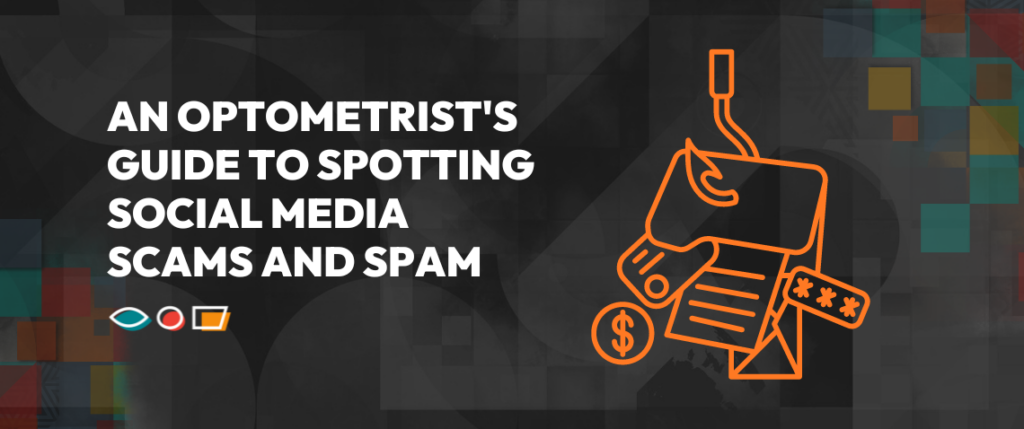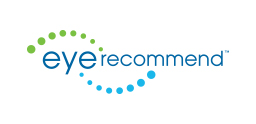Social media is an essential way for businesses, including optometry practices, to connect with patients and promote services online. However, with the increasing reliance on social media, there is also a rise in scams and spam that can affect your practice and patients.
Being aware of these threats and knowing how to navigate them helps you protect your practice and patients’ personal information. This guide will help you understand common social media scams and spam and provide tips on what to do if you find yourself a victim.
Navigating Social Media Spam Messages
Spam messages on social media can range from harmless promotional content to malicious links that compromise your personal and professional information. Here are some tips to help you navigate spam messages effectively:
- Recognize the Telltale Signs
Spam messages often come from unfamiliar accounts and include unsolicited promotions, threats of a suspended or blocked account, suspicious links, or requests for personal information. Pay attention to the sender’s profile and the content of the message.
- Avoid Clicking Links
If you get a message with a link, be cautious before clicking on it. Malicious links can lead to phishing websites designed to steal your information or infect your device with malware.
- Report and Block Spam Accounts
Most social media platforms have features that allow you to report and block accounts that send spam messages. Reporting these accounts helps social media platforms identify and remove them, protecting other users.
- Use Privacy Settings
Adjusting your social media privacy settings can reduce the likelihood of receiving spam messages from unknown accounts, but it also reduces your chances of being seen and engaged with by potential patients.
Common Phishing and Scam Methods
Phishing and scam attempts are becoming increasingly sophisticated, and your staff needs to be educated on common tactics used by scammers. Here are some of the most prevalent methods:
- Phishing
Phishing emails and messages appear to be sent from legitimate sources, such as banks or social media platforms. These messages often ask you to click a link or provide personal information. Always verify the sender’s identity before responding to messages.
- Online Promotions
Be cautious of online advertisements and promotions that seem too good to be true. Scammers often use enticing offers to lure victims into providing personal information or making payments for non-existent products or services.
- Impersonation Scams
Scammers may impersonate someone you know or a reputable organization to trick you into divulging personal information or sending money. Always verify the identity of the person or organization before taking any action.
What to Do If You Are Caught Up in a Social Media/Online Scam
Despite your best efforts, there may be instances where you or your staff fall victim to a scam. Here are steps to take if you find yourself in such a situation:
- Cease Communication
Stop all communication immediately if you realize you’ve been interacting with a scammer. Do not respond to any further messages or calls.
- Secure Your Accounts
Change the passwords for all your social media and email accounts. Ensure your new passwords are strong and unique. Enable two-factor authentication (2FA) where possible to add an extra layer of security.
- Report the Scam
Report the scam to the social media platform where it occurred. This helps the platform take action against the scammer and prevent them from targeting others.
- Monitor Your Accounts
Keep an eye on your bank accounts, credit reports, and social media accounts for any unusual activity. If you notice any unauthorized transactions or changes, report them immediately to your bank or credit bureau.
- Educate Your Staff
Share your experience with your staff to raise awareness about social media scams. Provide them with tips on how to recognize and avoid scams to prevent similar incidents in the future.
- Seek Professional Help
Cybersecurity experts can assist in securing your systems and recovering lost data, while legal professionals can provide advice on any legal actions you may need to take.
Safeguarding Your Practice from Scams
Social media scams and spam are an unfortunate reality of the digital world. As an optometrist, protecting your practice and patients from these threats is paramount.
By educating yourself and your staff on common scam methods, recognizing spam messages, and knowing what steps to take if you fall victim to a scam, you can mitigate the risks and ensure a safer online presence for your practice.
For support and advice on your social media strategy, reach out to your Marketing4ECPs account manager or get in touch with our team.
































